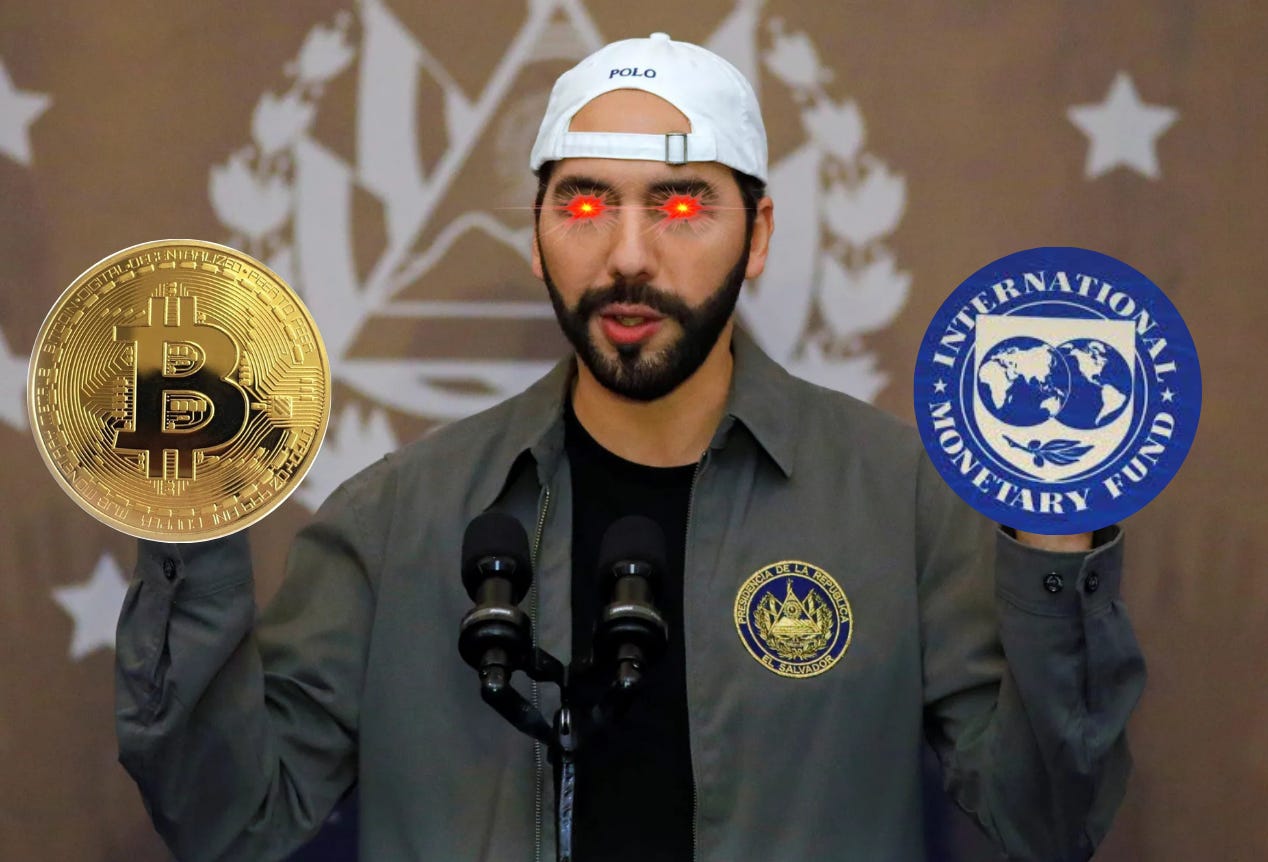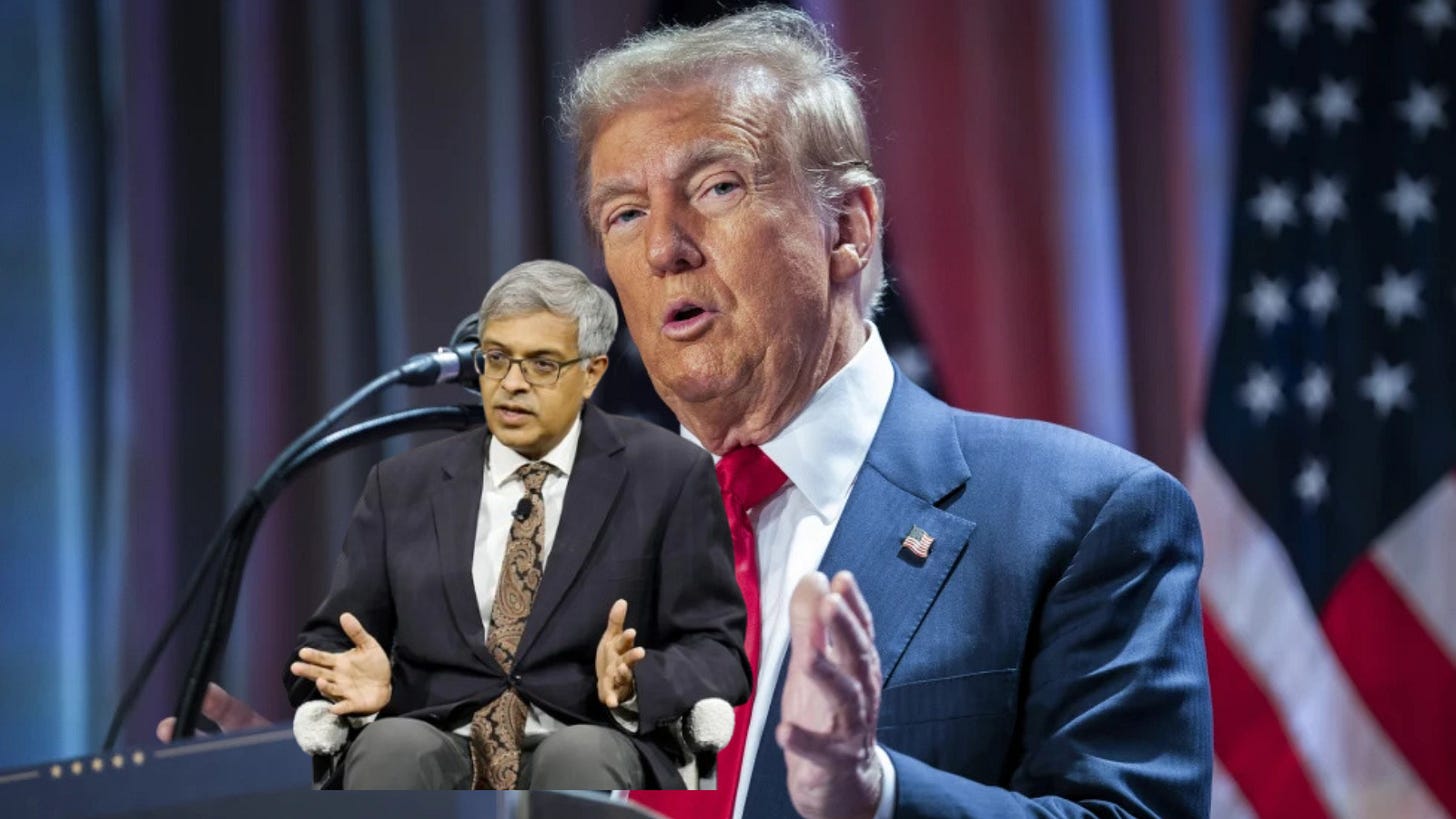Welcome to episode 13 of weekly freedom news, on Network States, individual sovereignty, Libertarian progress, developments in privacy (tech), hard money, economic (de-)regulation and more.
“No hay plata” - Javier Milei
⚡Top of the Agenda
One year of Milei in office. How did he do?
El Salvador strikes a deal with the IMF and could get rid of its Bitcoin legal tender laws
Lockdown skeptic Bhattacharya to lead the NIH under Trump
1. One year of Milei
We’ve reported a lot on Argentina’s president Javier Milei, who took office a year ago on December 10, 2023, because we are very anxious to see “El Loco” succeed. First of all because we simply like to see a country do well but also for our own sake: if he succeeds, many in the world might try to copy him, and some are already noticing. Conversely, if he fails to do anything short of spectacular, people will point to the crazy libertarian example whether it’s his fault or not.
Libertarians have historically never been elected to anything higher than mommy’s big freedom boy. However, Argentina was in such dire straits that its people would rather vote for an apparent lunatic who says he wipes his asshole with the state, than the status quo.
On a visit to Argentina last year, I talked to a local chef. When I asked him whom he would vote for, he threw a big pile of cash on the table (which would just about be enough to pay for our drinks), and said “you think I want this shit?” While it adds, or added, to our anxiety, that he took office in such a problematic situation, this may perhaps be the only reason he ever got attention in the first place.
Milei, upon taking office on record high inflation and the economy in shambles, promised more pain before it got better, and more pain the Argentines got, with record-high poverty just earlier this year.
However, with no other options: “people who voted for him are saying: ‘Let the madman get on with it’”. Well, how did the madman do? Is the pain over, or almost over? What will happen after?
How did he he got on with it?
Inflation
Upon his anniversary, Milei gave a speech, in which he said that inflation “will soon be a bad memory”. Inflation is indeed down, to 2,4% month-on-month in November. That is still a lot, at more than 30% per year, but it’s down a lot from the 25% figure when he took office, as well as under the 5% baseline of the last five years.
People even like the peso again. That shit, that the chef no longer wanted, is not so shit anymore.
On my visit we had to exchange euros or dollars for pesos on the blue (non-official) market, because if we had paid the ‘official’ rate, we’d have paid double. At the moment these rates are converging. This means you could go to Argentina and pay with your credit card, rather than a massive pile of cash.
Poverty
What about those record-high poverty figures. Are we seeing any relief there now? According to economist Daniel Lacalle, the answer is “yes”, as the poverty rate decreased to a still horrible 41.7%, but considerably down from 54.9%.
Government spending
For the ninth month in a row, Argentina hit a budget surplus, which it had not achieved in the previous 123 years. “From 2.7% primary deficit to 1.7% surplus”, writes Lacalle.
Not everyone is better off, though, as many government employees have to find other work, and sadly so too are pensioners.
Wages
Those who lost their government job may find other jobs with higher wages, which are also increasing, due to the figures shared by Lacalle.
De-regulation
Milei has removed more than 800 regulations, more than 2 per day. A winning example is the Argentine housing market, where official statistics say the prices are down 27% after removing rent controls and other such restrictions. This unofficial account mentions the rental prices are down 50%.
Growth:
GDP is down, perhaps due to government spending cuts that have to slowly be replaced by the free market.
Do they still like him?
Yes, about half like him, and they’ve liked him all along. The rich like him a bit more, but the poor also still like him a fair bit. I’m curious to see how this figure changes in a year, as hopefully there will be fewer poor people.
Symbolic victories
In Argentina I was told to go and read Hayek. In the reason.com documentary on Milei that we shared last week, youngsters mention reading Mises and Rothbard.
As mentioned above, if he’s successful, others will try to copy him. Ideas are contagious.
Viva la libertad carajo!
2. El Salvador takes on foreign debt anyway
El Salvador is close to securing a $1.3 billion loan from the IMF, which would mark its return to international financial markets after years of relative isolation following its controversial adoption of Bitcoin as legal tender in 2021.
Why did El Salvador decide to strike a deal with the IMF? One year ago, president Bukele expressed that he would not take on any more foreign debt.
According to Alex Gladstein from the Human Rights Foundation, the IMF isn’t a positive influence its debitors.
However, just as Milei has done with Argentina’s IMF deals, Bukele may simply want to give his economy a boost, for which the deal could be beneficial, at least in the short term:
“In his second term, the president has focused on reviving El Salvador’s economy and seeking foreign investment to boost its fortunes. Banks have turned positive, with the country’s risk rating tumbling from 3,500 basis points above US Treasuries in July 2022 to just 398 basis points last week.”
Legal tender is a form of money recognized by law as a valid means to settle public or private debts, including tax payments, contracts, and legal fines.
National currency typically serves this purpose in most countries and in El Salvador, the US dollar serves this purpose.
If a currency is legal tender, it comes with a mandate for businesses to use it: they have to accept it.
On a visit to El Salvador last year, many El Salvadoreans, even those on the fames Bitcoin Beach, were not interested in Bitcoin, preferred dollars, and had no means of receiving Bitcoin anyway. So maybe they had to accept it but they clearly didn’t care to comply.
The potential agreement requires El Salvador to drop the legal mandate, make significant budget deficit reductions, pass an anti-corruption law, and increase national reserves from $11 billion to $15 billion.
Legal tender is governed by a statute, so El Salvador would have to remove what was put in place in 2021 before being granted the IMF funding.
The government has been accumulating Bitcoin as reserves, with president Nayib Bukele claiming their cryptocurrency reserves are worth over $600 million, representing a 127% gain, which he playfully referred to as their "first #Bitcoin piggy bank".
As much as we are fans of Bitcoin, forcing it on people is not our idea of freedom.
Hayek and legal tender laws
If we look deeper into legal tender laws, the Austrian economist Friedrich Hayek already proposed in the 1970s to replace government-mandated legal tender with a system of private currencies issued by financial institutions.
Under Hayek's model, currencies would compete based on their stability of value, with users naturally gravitating towards money that provides a balanced approach to preventing both creditor and debtor losses.
The competitive currency system would rely on financial institutions creating and regulating their own currencies primarily through loan-making and secondary trading activities.
Hayek theorised that market competition would naturally drive the development of more stable currencies, potentially leading to the creation of monetary bases composed of extensive commodity baskets.
3. Jay Bhattacharya: Trump’s NIH revenge pick or scientific reformer?
Context
Jay Bhattacharya, the newly appointed National Institute of Health (NIH) director, is a Stanford-trained physician, epidemiologist, and economist with 152 peer-reviewed articles and multiple research grants.
The NIH is the primary U.S. federal agency responsible for conducting and funding biomedical and public health research. It also disseminates health information to improve public health outcomes.
Bhattacharya is a notable pick for NIH director because of his outspoken and freedom orientated criticisms about COVID, lockdowns and herd immunity.
In this vein, he co-authored a highly controversial article, ‘The Great Barrington Declaration’ in October 2020, advocating for a herd immunity approach that challenged mainstream pandemic response strategies.
Argued that lockdown measures were causing more harm to economic and mental health than the virus itself, proposing a ‘Focused Protection’ strategy to shield vulnerable populations.
Faced significant professional backlash, including death threats and social isolation, for his critical stance on pandemic management.
NIH Nomination Mandate and Institutional Reforms
Bhattacharya aims to link federal research grants to universities' academic freedom ratings, targeting what he perceives as cancel culture in academic institutions.
One way he intends to this is by using the Foundation for Individual Rights and Expression (FIRE) rankings to assess and potentially penalize universities with low free speech scores.
Moreover, he seeks to implement term limits for research institute leaders and consider reducing NIH institutes from 27 to 15.
In order to foster the creative dynamism of the past, he also wants to prioritize younger researchers, create a new type of scientific journal with names of reviewers for increased transparency.
However, his ideas about introducing further cost-benefit analysis style thinking into research funding may backfire.
Academic institutions are already trying to assess the potential impact of research.
This is not just hard to do, but fundamentally impossible to do for budding research programs and scientists working on frontier breaking research problems. Such a method has been a failure and as a result, stalls fundamental progress.
Follow promising ideas and research avenues, not predictions of knowledge not created yet!
Criticism
As mentioned above, Bhattacharya has been criticized for his contrarian views regarding the scientific process within the medical research establishment.
One area where we think the criticism is fair, is his significant underestimating of COVID-19's potential death toll.
More broadly
Bhattacharya advocated for challenging scientific conformity and encouraging diverse perspectives in research.
He also Serves on the board of "Biosafety Now," advocating for bans on enhanced pathogen research and seeking accountability for the COVID-19 pandemic.
If confirmed, he would oversee the NIH's $48 billion annual research budget, which funds 27 separate institutes and centers across the United States.
Also this week
Bitcoin
Trump confirms plans for a Federal Strategic Bitcoin Reserve.
Here’s someone making a case why neither should have one.
European Union Womp Womp Of the Week
OpenAI’s new Sora model unavailable in the EU.
Longevity
Bryan Johnson, the man who will live forever, is coming with a documentary in January.
Network States
Praxis Nation shares its “Declaration of Ascent”.
Trump wants freedom cities. (We will return to this topic if it turns out to have legs.)
Bitcoin Jesus
From Robert Malone’s Substack, a much deeper dive on our story from last week, where we reported on “Bitcoin Jesus” Roger Ver, on trial to be imprisoned for “109 years for the crime of following his lawyers’ advice”:
Roger Ver also appeared on Tucker Carlson, where they dive into how transactions are being monitored by the government.
Speaking of privacy
If you don’t like all of your transactions monitored, Joel Valenzuela, a Free Stater and privacy freedom fighter who works for Dash, an old privacy cryptocurrency, has written a comprehensive guide on how to live, privately, on just cryptocurrency.
Should you like to help privacy in the future: Shielded Labs is looking for engineer(s), to help them build the future of Zcash, a cryptocurrency with built-in privacy features.
Patrick McKenzie, a self-described cryptocurrency skeptic, admits that debanking is indeed a problem, in his deep-dive on unbanking.
A major hack into the phones of, among others, Trump, by what is thought to be the Chinese government, goes mostly ignored, so I’m posting it here as the last side story.
Interesting media
Samourai Wallet, a wallet with a built-in mixer for privacy, saw its developers arrested and charged earlier this year.
A discussion on the status of ZEDEs in Honduras:
Events
Ongoing: The Network School, Near Singapore: September 23 - December 23, 2024.
Vitalia Forever, Vitalia City, Próspera ZEDE, Honduras: January 6th - March 3rd, 2025.
Edge Esmeralda 2025, Healdsburg, CA, USA: April 24th - June 21st, 2025
See based.guide’s event page for all events.







